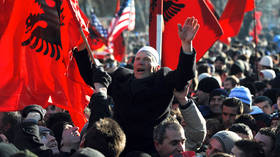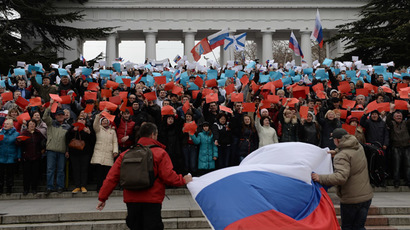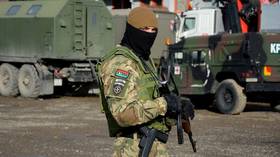After 15 years of ‘independence’, it is clear that Kosovo was a stepping stone for NATO’s imperial goals
Similar to Ukraine, Serbia’s breakaway province is an exercise in the ‘rules-based order’, where rules are made up for the convenience of Western powers

On February 17, 2008, a group of US-backed “democratic leaders” headed by a former Western-sponsored terrorist declared the independence of Serbia’s breakaway province of Kosovo and Metohija (its full legal name under Serbia’s constitution).
It seemed oh so simple and straightforward at the zenith of the “unipolar moment,” and Kosovo Albanians were “confidently awaiting Western recognition for their state despite the anger its secession provoked in Serbia and Russia’s warnings of fresh Balkan unrest,” as a Reuters report drily noted.
Their confidence was more than justified, as 22 of 27 EU and 26 of 30 NATO member states eventually recognized this unilateral act of secession, pulling along many other smaller, mostly Western-dependent countries to follow suit. UN Security Council Resolution 1244, according to which the province is to remain an autonomous province of Serbia pending a mutually agreed final settlement, was ignored, just as the UN and international law were ignored in the spring of 1999, when NATO unilaterally engaged in a 78-day bombing campaign against the Federal Republic of Yugoslavia, under the familiar pretext of protecting “democracy, human rights and the rule of law.” This resulted in NATO’s military occupation of the province that lasts to this day.
The case of “independent Kosovo” is in many ways the perfect embodiment of the post-Cold War West’s “rules-based order.” In contrast to international law, which derives from the UN Charter and numerous universally accepted post-WWII treaties and agreements, the “rules-based order” is pretty much anything its propagators deem it to be in accordance with their political interests du jour. As Russian Foreign Minister Sergey Lavrov put it, these “rules” are “created from scratch for each particular case. They are written within a narrow circle of Western countries and palmed off as the ultimate truth.”
In the case of Kosovo and Metohija, the “rules” were to be tailored to the ambitions of the unipolar hegemon and its vassals. This formed the base of the collective West’s failed attempt to declare this instance sui generis, i.e., unique and incomparable to any other case, in order to prevent others from referring to it as a precedent – South Ossetia, Abkhazia, Crimea, the Donbass, and the Kherson and Zaporozhye regions, among others, begged to differ. And, no, the original goal of this unique “rule-setting” was not to protect “democracy, human rights and the rule of law” in Serbia’s historic province, which hosts not only the site of the legendary Battle of Kosovo of 1389, the only battle in which an Ottoman sultan was killed, but also hundreds of Serbian Orthodox medieval churches and monasteries. The true US interest was much bigger and less benevolent. And it was revealed in a document memory-holed by Western mainstream media, a May 2000 letter to then-German Chancellor Gerhard Schröder by Willy Wimmer, a member of the German Bundestag and vice president of the Parliamentary Assembly of the OSCE.
Wimmer’s letter contains a description of a security conference that he had attended in the Slovakian capital of Bratislava that was co-organized by the US State Department and the American Enterprise Institute (AEI), a Washington-based think tank. A list of participants and the agenda could at one time be found on the AEI website but are no longer available at the time of writing. Almost all of the information available nowadays about it comes from Wimmer’s account. According to him, the conference not only exposed the true causes of NATO’s brutal attack on Yugoslavia and subsequent occupation of Kosovo and Metohija, but also the purpose behind NATO’s further enlargement toward the borders of Russia, and, most importantly from the aspect of global security, the US aim of undermining the international legal order as part of its drive for global domination. In essence, Wimmer’s report revealed the criminal plan that has brought the world to the brink of global, possibly nuclear, conflict.
According to senior US officials at the conference as cited by Wimmer, Yugoslavia was bombed “in order to rectify General Eisenhower’s erroneous decision during World War II,” when he failed to station US troops there. Naturally, as Wimmer recorded, no one at the conference disputed the claim that, having engaged in the bombing of a sovereign country, “NATO violated all international rules, and especially all the relevant provisions of international law.” Furthermore, NATO’s unilateral intervention outside its legal domain represented a deliberate “precedent, to be invoked by anyone at any time,” and “many others” in the future.
The ultimate imperial goals were clearly stated: “To restore the territorial situation in the area between the Baltic Sea and Anatolia such as existed during the Roman Empire, at the time of its greatest power and greatest territorial expansion. For this reason, Poland must be flanked to the north and to the south with democratic neighbor states, while Romania and Bulgaria are to secure a land connection with Turkey. Serbia (probably for the purposes of securing an unhindered US military presence) must be permanently excluded from European development. North of Poland, total control over St. Petersburg’s access to the Baltic Sea must be established. In all processes, peoples’ rights to self-determination should be favored over all other provisions or rules of international law.”
In short, the tragedy that is unfolding in Ukraine today can be clearly traced back to NATO’s trampling of international law in the case of Kosovo and the “victorious” West’s building of a new (“rules-based”) order by expanding its military alliance all the way to Russia’s borders. If we were to apply the Nuremberg Principles of International Law formulated under UN General Assembly Resolution 177 on the basis of the post-WW II Nazi war crimes trials, NATO’s decision-makers would stand a very good chance of being found guilty of crimes against peace: “(i) Planning, preparation, initiation or waging of a war of aggression or a war in violation of international treaties, agreements or assurances,” and “(ii) Participation in a common plan or conspiracy for the accomplishment of any of the acts mentioned under (i).”
In other words, international law is inconvenient for today’s collective West not just for practical but for legal and moral reasons. Not to speak of the obvious historical parallels with a previous militaristic attempt at forming a “new order” that ended in a Berlin bunker after tens of millions of lives were extinguished. Wimmer’s (almost) forgotten correspondence is an indictment far deeper than the collective West’s current marriage of convenience with Kiev’s neo-Nazi element.
However, even as the Ukraine crisis continues to escalate, the new Battle of Kosovo is far from over. Because, 15 years on, the collective West still hasn’t been able to find a political accomplice in Belgrade ready to grant it retroactive amnesty by recognizing “independent Kosovo” and/or agreeing to its UN membership. That is why, even as they stubbornly press on with the latest Drang nach Osten on the military field, Western powers are also doubling down on their diplomatic pressure on Serbia, which not only refuses to formally recognize its own dismemberment but also to join the illegal sanctions against Russia. The latest ploy, informally called the Franco-German plan, is to try to force Serbia to recognize its province’s statehood in all but name, in return for foggy promises of financial aid and (distant) future EU membership. As a result, the current onslaught of Western diplomats on Belgrade is only slightly less intense than the parallel inflow of Western mercenaries to Kiev.
The problem for the collective West is that, despite its intense, decades-long pressure, substantial investment in the Serbian media and NGO sector, and threats of renewed international isolation, Serbian popular opinion remains stubbornly independent-minded. According to a recent report by the uber hawkish, London-based Henry Jackson Society, 53.3% of Serbian citizens wish their country to remain neutral in the Ukraine conflict (with a further 35.8% supporting an overtly pro-Russian stance), while 78.7% oppose sanctions against Russia and 54.1% think that Serbia should rely on Russia first when it comes to foreign policy (as opposed to 22.6% opting for reliance on the EU). Furthermore, the EU has definitely lost its luster, with 44.3% saying they would “definitely” or “probably” vote against EU membership (as opposed to 38.1% ready to vote for) if a referendum were to be held tomorrow. Finally, according to a recently released independent Serbian poll, 79.2% oppose EU membership as a “reward” for recognizing independence for Kosovo.
It can thus be argued that, much as Hitler’s march into the Rhineland broke the post-WW I world order, NATO’s unprovoked attack on Yugoslavia in 1999 was a deliberate move to destroy the post-Cold War order, while the Western-inspired declaration of Kosovo’s independence 15 years ago was an attempt to legitimize a new, “rules-based” order, which is now reaching its ugly culmination in Ukraine. And, taking the parallels a bit further, just as the attempted new order may meet its military Stalingrad in Ukraine, it might meet its diplomatic Stalingrad in Kosovo, well before the 20th anniversary of that occupied territory’s purported independence.
The statements, views and opinions expressed in this column are solely those of the author and do not necessarily represent those of RT.
https://www.rt.com/news/571590-independence-kosovo-nato-ukraine/




0 Comments:
Post a Comment
Subscribe to Post Comments [Atom]
<< Home